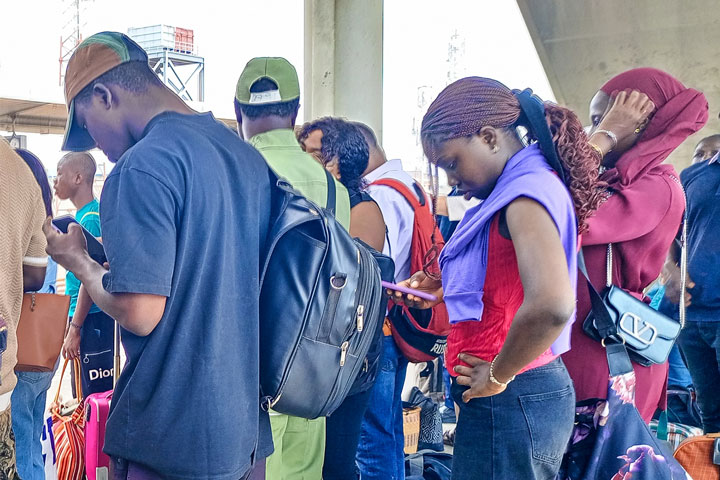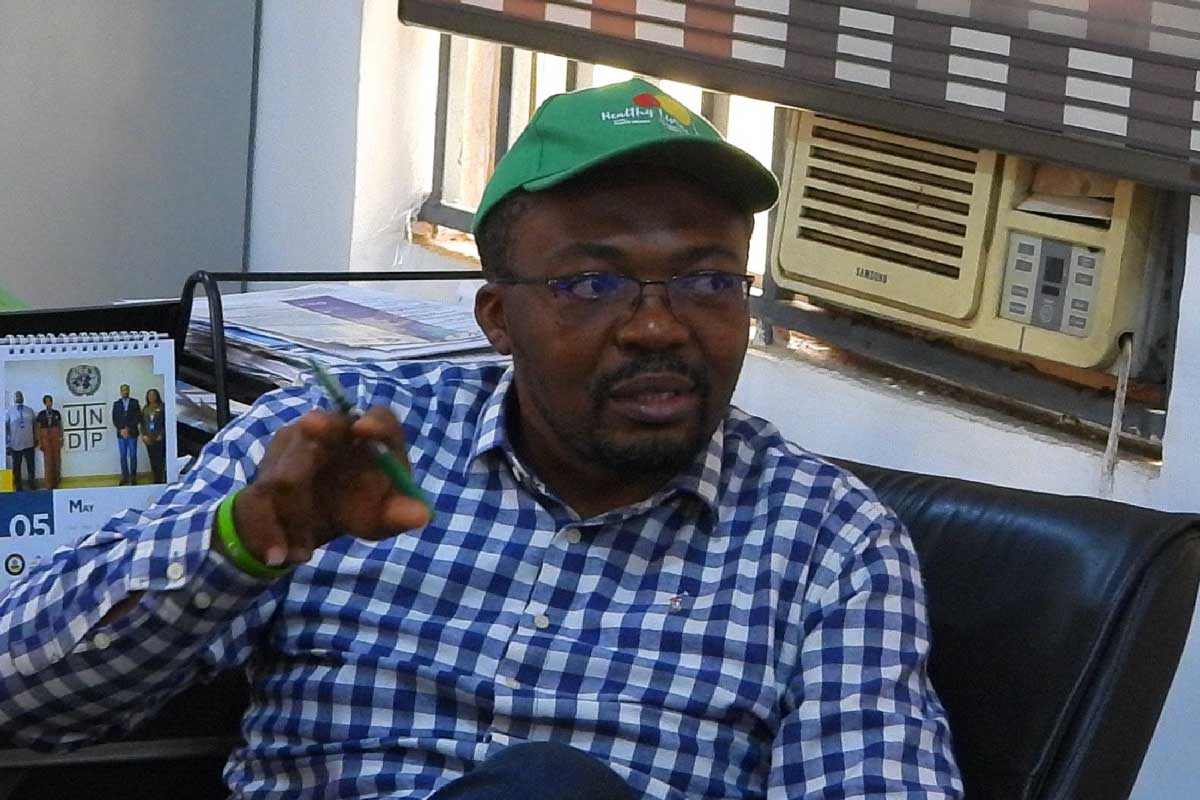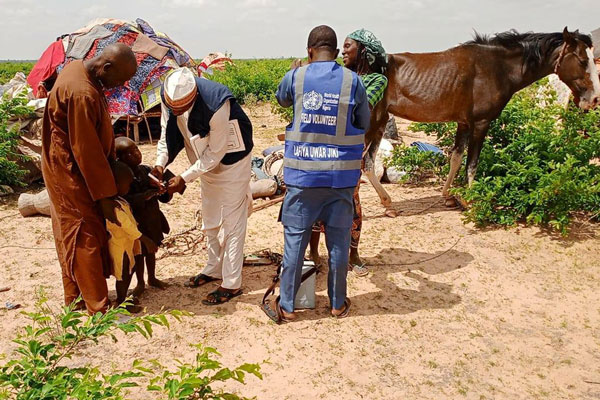The mobile game driving vaccine awareness in Nigeria
As vaccine hesitancy and misinformation persist, an unlikely tool that blends fun with science is helping children and parents understand how vaccines work and why they matter.
- 23 September 2025
- 6 min read
- by Jesusegun Alagbe

Through much of 2023 and 2024, seven-year-old Amina Salisu spent her evenings cross-legged on the floor of the family living room in Bauchi, northern Nigeria, eyes glued to her mother’s phone. She wasn’t watching a cartoon or crushing jewel-coloured candies; instead, what had captivated Amina’s attention was Adventures of Wazobia, an educational mobile game in which choices mean everything.
On the screen, a young mother has to decide whether to take her baby for vaccination at the health centre, or listen to her neighbours, who are spreading vaccine misinformation. Amina tapped the key that sent the mother character to the clinic. A cheerful chime sounded, and a message flashed up announcing the baby had grown stronger, confirming that Amina has made a sensible choice.
“When you pick a character, say a mother, and she has to take her baby to the clinic for vaccination. Along the way, she will meet people who will discourage her from bothering with the vaccine, but then others will tell her to go. The mother needs me as the player to help her make a choice. If I pick the right answer, the baby gets stronger, and I win points. If I pick the wrong choice, the baby can get sick, and I lose points,” Amina giggled, explaining how the game works to VaccinesWork over the phone.
“Through the game, I have learned many important lessons about my health, including topics on childhood vaccination and nutrition. I showed my mother how the game is played, and over time, she too learned to play. It’s fun.”
Amina said she had referenced the game during playtime with her friends. “I thought it was better if my friends were introduced to the game so they too could be better informed about health matters. Some of them enjoy playing the game,” she said.
Pocket classroom
“I think Amina first heard about the game from a Hausa radio jingle that played sometime in 2023 after an evening drama. Curious, she dialled the toll-free number on my phone. Soon, I saw her helping the game characters make decisions about issues like pregnancy care and childhood vaccines,” Zainab Salisu, Amina’s mother, told VaccinesWork.
Playing the game, which is built on an interactive voice response (IVR) format, children like Amina are discovering that health lessons don’t have to come from schools or health centres – and that smartphones can double as classrooms.
That’s exactly why the Johns Hopkins Center for Communication Programs (CCP), stated it developed Adventures in Wazobia, which has gained popularity among many children, as well as their parents and guardians, particularly in northern Nigeria.
Have you read?
Launched in February 2023 through the Breakthrough ACTION-Nigeria project, CCP said on its website that over 500,000 people had spent 5 million minutes playing the game by March 2024. It stated that the game is available in several local dialects, including English, Hausa, Yoruba, Igbo, and Pidgin, and is being played across Nigeria.
In at least the Salisu household, the minutes spent playing the game are having a real-world effect. “Nowadays, my daughter always reminds me to take her three-year-old brother to the health centre for routine immunisation. She says she doesn’t want her brother to get ill. I’m always hearing that from her. Her reminders help me not to forget taking my son for his routine immunisation,” Zainab said.
Why gaming for health?
In 2024, just 67% of Nigeria’s kids had received the recommended third dose of the basic diphtheria, pertussis and tetanus-containing vaccine, used as a benchmark for vaccination coverage in general. Too many children miss out on life-saving vaccines each year due to misinformation, mistrust and awareness and access barriers.
Health experts believe that health campaigns often struggle to reach sceptical parents, while traditional posters and radio jingles rarely hold children’s attention – meaning that new approaches that spark curiosity and build trust from the youngest generation on up are overdue.
Idi Nasiru, a senior CCP programme officer involved in the development of Adventures of Wazobia,explained that it’s not only the entertainment value, but also the interactivity of gameplay that has a powerful draw. Unlike the radio drama that inspired the game, the game permits users to be part of the story.
According to neurologist and start-up co-founder Olusina Mike, making choices and experiencing the consequences – even in play – cements lessons in memory.
“Interactive ways of educating people, particularly children, about vaccines and general health are very effective. Mobile games are a game-changer, and I think it’s an innovation that should be promoted. Introducing mobile games in this manner is learning something serious in a non-serious way. Studies have shown that when children are exposed to educational media, it develops their cognitive skills. It improves how the children think,” Mike told VaccinesWork.
A similar game developed by CCP is Kacici Kacici, a Hausa term meaning “riddle.” The low-tech game, which can even be played on a feature phone, focuses on social, maternal, newborn, and child health in northern Nigerian states.

“It’s an adventure game that speaks our language and teaches great health lessons,” said Mustapha Sani, a health teacher based in Birnin Kebbi, Kebbi State, northern Nigeria. “Games are immersive, and I usually encourage my students, even my own children, to play the game. Children learn better when there is an immersive experience, and through that, they get to understand the consequences of their choices in real life, such as what can happen if a child is refused vaccination.”
Dual appeal
Meanwhile, Mike, the medical doctor-cum-health influencer, said the brilliance of such games lies in their dual audience. While children are drawn to the graphics, competition and rewards, parents can sit beside them and pick up on underlying health messages.
“For instance, in homes where medical information feels technical, games can become conversation starters. Parents can also play and learn from games designed to pass crucial health topics,” he said.
Mike hopes that in the near future, more developers will jump aboard, and build games that teach families about health. He, however, notes that for innovations like that to be sustainable, there is a need for more collaboration between the government and the developers.
“If we can get collaborations at the level of the government and scale such products, it will help many children and families in the country. It is a tool that can be adapted across schools as a teaching aid. Even new moms and dads can use it for vaccine education. Better collaborations will make tools like this sustainable.
“These days, not every child listens to the radio or watches TV. Some spend their time on mobile devices, so we must catch them young at that very level. The government can give grants to health tech companies to come up with innovations,” he said.
However, Mike advises parents and guardians to monitor the activity level of children playing such games so they do not also serve as distractions. “As much as such games are educational, they should not be abused by children,” he said.








